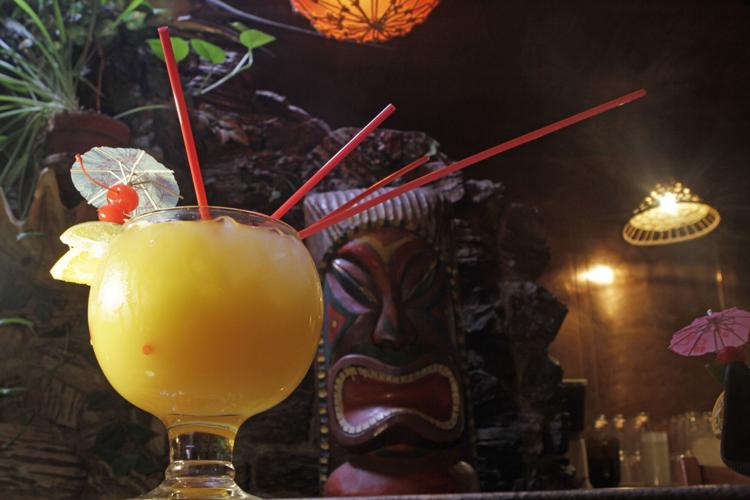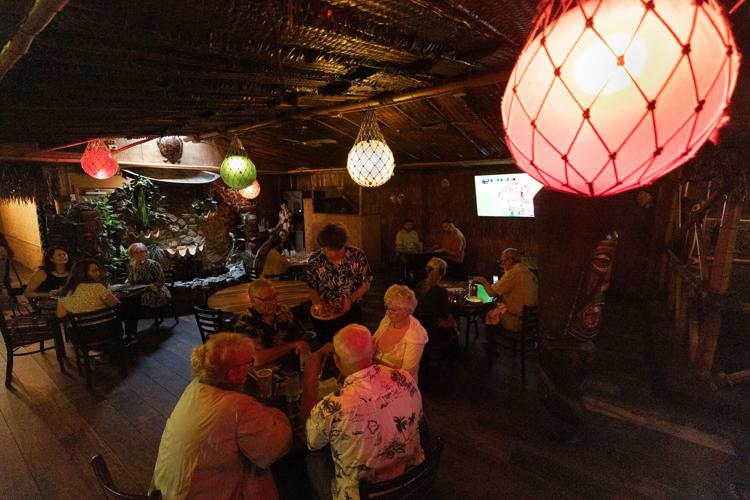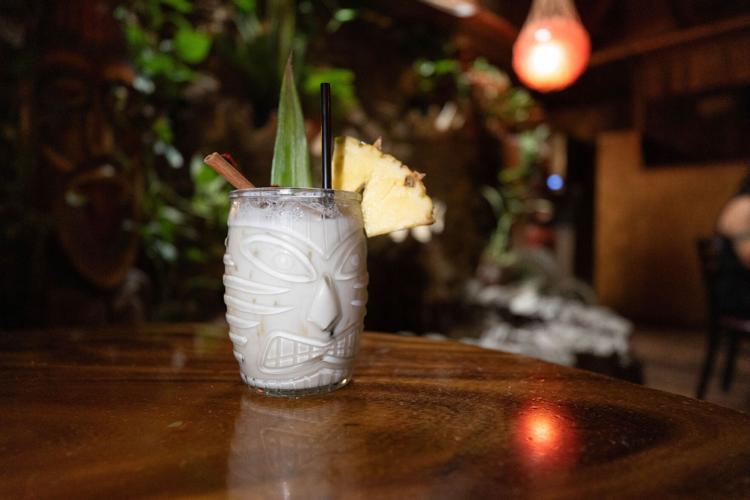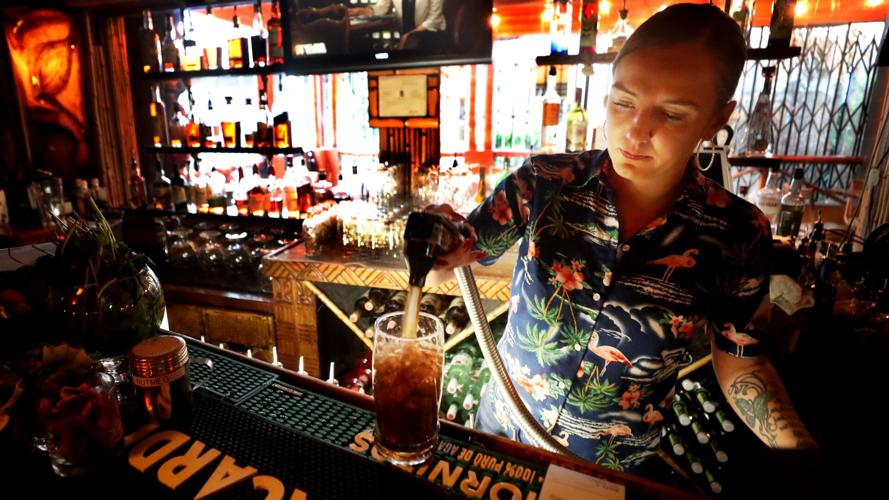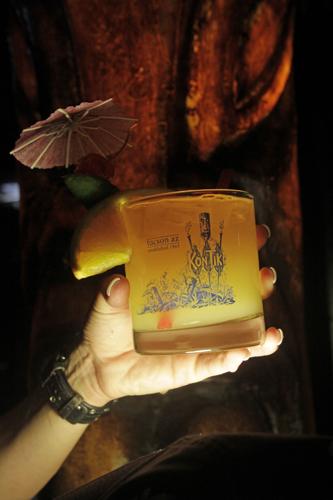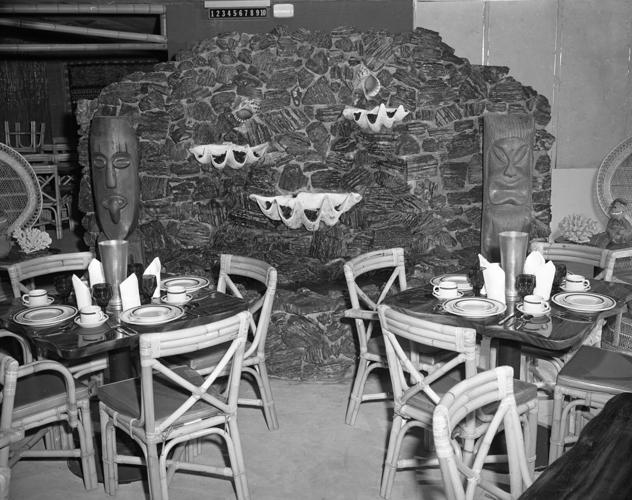Dean Short made a career out of transporting Tucsonans out of the desert, by bringing elsewhere to us. Props have been central to the game: a neon gas lamp, larger than life, outside of Ye Olde Lantern steakhouse; a steer statue on the roof of Cow Town in Amado; the Wild West movie set appeal of El Corral. Nowhere, though, were the props more extravagant, or more central, than Kon Tiki.
The windowless bar is dressed from floor to ceiling like a Polynesian outpost that exists more in the American historical imagination than in Tahiti. The tropical kitsch conjures a place totally unlike Tucson: a water fountain homed in a giant clam, lamps like enormous marbles hanging from the ceiling in fishing nets, dining room separators made of stacked coconuts.
Live animals have been used. What is now used as a patio was once an aviary of parrots. All of the tropical fish in their tank were born in it: the colony has been self-sustaining for decades.
The rum-forward menu was taken from its forbears like Trader Vic’s: almond-tinged mai tais, technicolor blue Hawaiis, potent zombies, fruity pain killers and their specialty, the scorpion bowl.

A “Pain Killer” at Kon Tiki contains Zaya Caribbean rum, Nephew overproof rum, a coconut milk base, and a dash of elderflower.
“A single scorpion is four shots of liquor with elixirs, juices, all secrets. I couldn’t reveal what’s in it. But I know there’s only a handful of people who know (Kon Tiki’s) exact recipe,” Jeffrey Glomski, the current general manager of Kon Tiki, said.
Both Short and the tiki fad were in their fullest powers in the '60s, when Short opened Kon Tiki, 4625 E. Broadway. Short recruited the acclaimed tiki artist, Milan Guanko, to carve the idol guarding the bar’s entrance and design a signature mug that has, like many in the annals of tiki, become a collector’s item.
Kon Tiki is releasing another collector’s item on Sept. 24. They are celebrating their 60th anniversary with a run of 120 tiki mugs, along with other ephemera like swizzle sticks in the design of the Milan Guanko idol. Flash in the Past Studio is organizing the anniversary party, complete with a DJ set and limited-edition cocktails. Tickets for the event, which starts at 6 p.m., cost $10. Vintage attire is encouraged.

Kon Tiki is one of the oldest operational tiki bars in America. The bar is celebrating its 60th anniversary on Sept. 24 with a party.
“If you ask me what I’d like people to know about the tiki, it’s that there is an oasis, an escape, here in Tucson. It’s just tucked behind trees and buildings. Been here for the last 60 years. And, yeah, you know, it’d be great to see it around for another 60,” Glomski said.
Kon Tiki is the fifth-oldest operational tiki bar in the country. Its peers are all in bigger cities than Tucson: San Francisco, where the tiki trend started; Los Angeles and Chicago.
“It’s a cool place, it’s something different,” Glomski said. “I believe now, we’re only one of two places (in Tucson) that serve that kind of cuisine. Everybody else has closed down. Times are a lot different now than they were 20 years ago. When I started off in this business, it was back in the '80s, it seemed like people went out more. Now, people are cautious about how they spend their money. Cost of living has gone up, wages, you know, it seems like it’s a whole different place nowadays, you know?”
“It’s been around for 60 years, so people who came there at that time are on their way out, unfortunately. I know that I’ve seen a handful of people who have passed away since I’ve been there who were regulars,” he said.

Bartender Anna Monosmith prepares a drink for a customer at Kon Tiki on Aug. 5, 2022.
Kon Tiki might not have made it to 60 without its current owner, Paul Christopher. Christopher started at Kon Tiki as a dishwasher over 30 years ago and worked his way through all the service stations up to bartender. He learned the intricate, in-house variations of famously complex tiki cocktails. When a former owner was looking to sell the bar, Christopher purchased the entire property.
“The owner owning the building is a big thing. Would it have made it through COVID if it wasn’t? Probably not,” Glomski said.
Tiki has a devoted community: while some are interested in the props, the mugs and stage work, others seek mastery of the challenging cocktails. Kon Tiki’s status as the longest established tiki bar in the southwest might have attracted particularly dedicated staff.

The island themed bar at Kon Tiki transports Tucsonans to another place.
“Y’know, that’s a whole culture out there,” Glomski said.
“There’s definitely a couple of die-hards out there,” Glomski said. “I just recently lost one who moved to Hawaii. That was in the last six months. Daniel (Wadsworth) was there from before when I started there (five years ago), so. He lived and bled tiki. He had a friend who lived out there and was a bartender at some resort. I think he’ll always be a bartender. He’s just that personality.”

Kon Tiki has been serving Tucson for 60 years.
Kon Tiki’s greatest asset also presents a great challenge: time. The decor and drinks, like their scorpion bowls, have been preserved by many generations of owners, bartenders and patrons. Glomski, a chef and former restaurateur, was hired to update the menu, but he had to keep corny classics like monkey on a stick (marinated beef skewers) central to their offerings.
“They basically made their little oasis here in the desert. I’m not going to say the recipes have changed throughout the years to what they are now. (These are) basic recipes you know, from way back then,” Glomski said.
“We try to maintain it as best we can, which can be a challenge at times: plumbing and things like that, you know, erode away over time,” Glomski said.
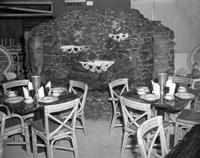
Kon Tiki, which featured South Sea island and American food, is shown here just before opening for customers in January 1962.


